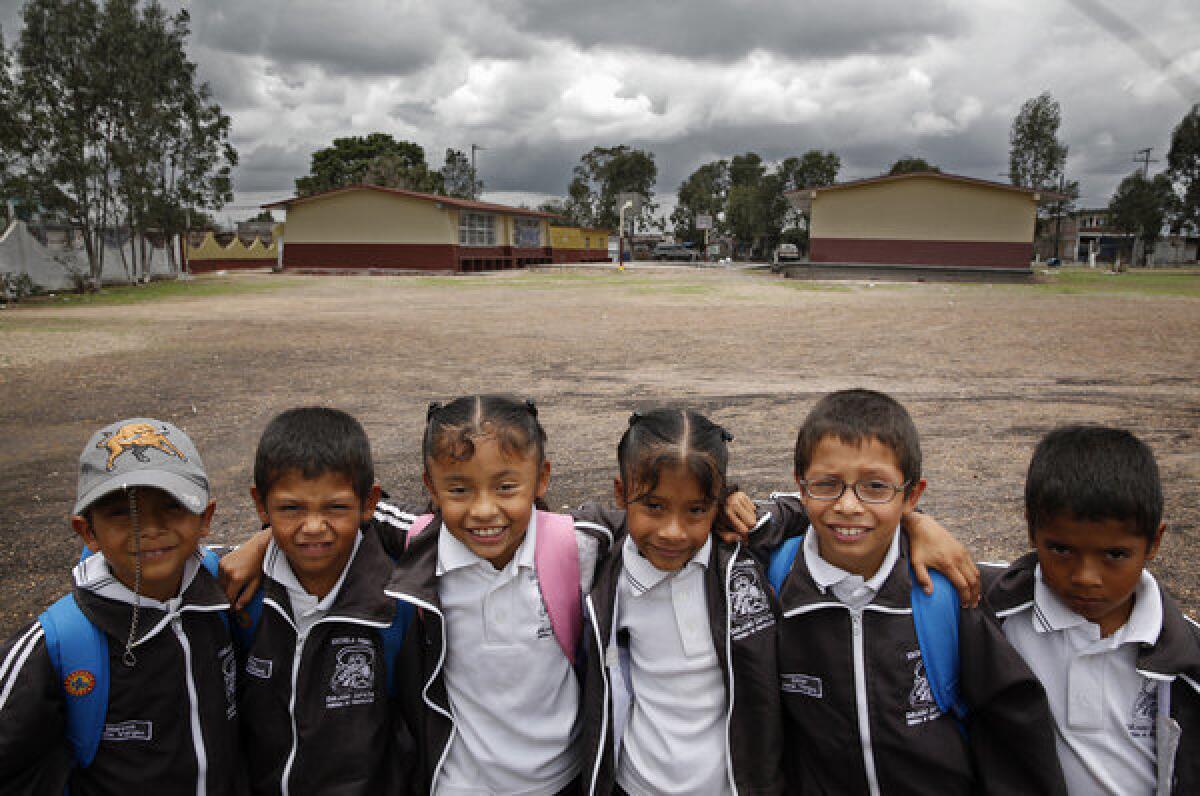After return to Mexico, she fights crime, runs afoul of law
Nestora Salgado led a town rebellion against crooks in Guerrero state, only to land in federal prison after making an arrest that some say overstepped boundaries.
- Share via
S
urely, this is not the returning-immigrant experience that Nestora Salgado imagined.
At first, the 41-year-old mother of three was, in the words of a supporter, "a sensation" in her mountainous Guerrero homeland, where she returned recently after 20 years in the United States. As she led this remote town in an uprising against vicious criminals, she was fierce, confident, charismatic.
"She had more right to be the leader because she has more guts than any man," said villager Marisela Jimenez.
On the day in October when Olinala rebelled, it was Salgado who commandeered a police patrol car and used its megaphone to call people into the streets. "Leave your fear at home! Come out!"
And, as church bells tolled in solidarity, they came out, by the thousands. Within days, they had expelled many of the crooks, villagers say.
But her adopted American "can-do" met a Mexican "can't-be."
Today, Salgado sits in a Mexican penitentiary, far from her home and her people, accused of kidnapping and guilty, certainly, of having run afoul of a clash of cultures, politics and generations-old clan rivalries.

Guerrero has long been one of Mexico's most geologically and politically turbulent zones. It gets gut-punched as the epicenter of most of the region's earthquakes, and its inhospitable, rugged mountains were home to bandits and guerrillas for decades. Indigenous pueblos demand their rights fiercely and sometimes violently. Cornstalks grow sideways, determined to cling to jagged stone cliffs.
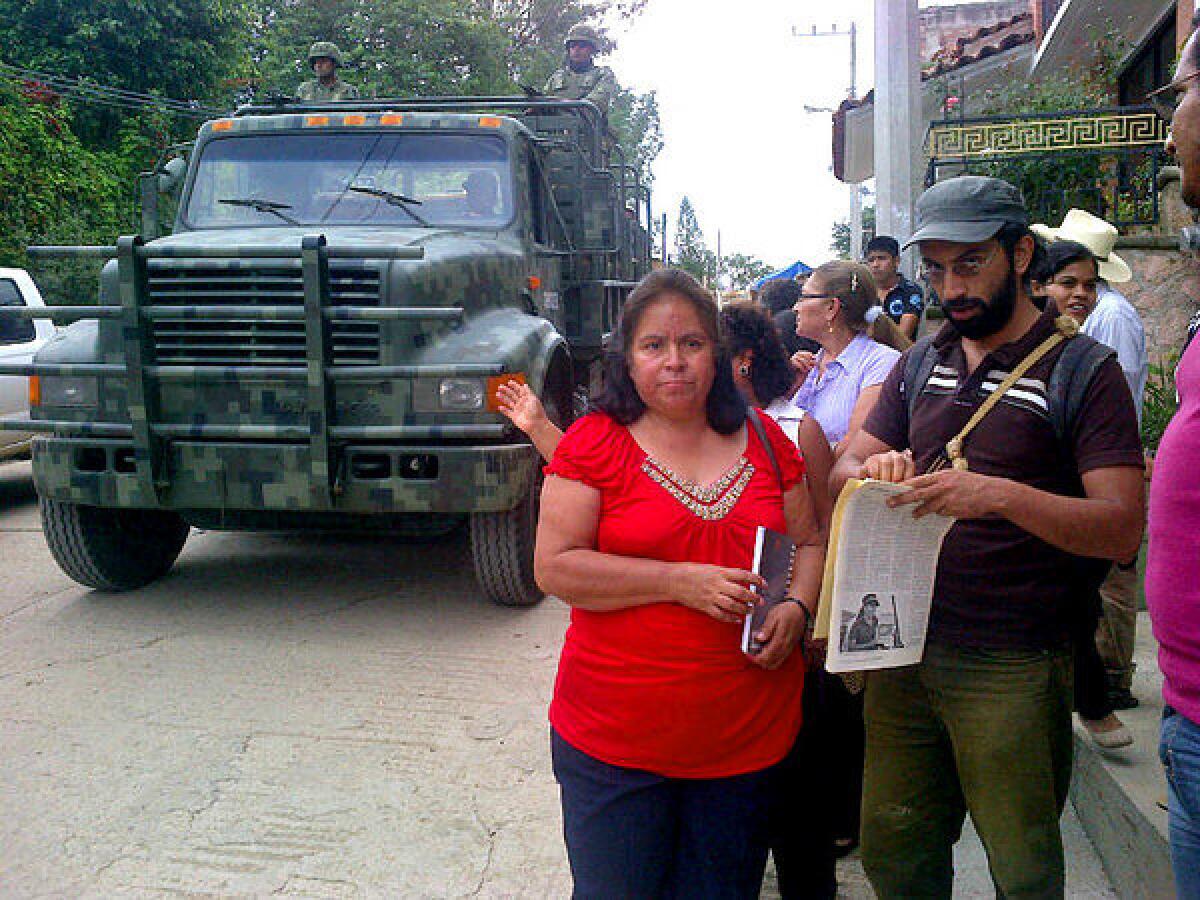
A Mexican army truck rolls by minutes before townspeople in Olinala, including Nestora Salgado's sister Cleotilde, meet to discuss Salgado's case. More photos
The name of Salgado's hometown, Olinala, means "place of earthquakes" in the Nahuatl language. By bus, it would take hours to get there from the nearest city, if there were buses. But few buses go. The single paved road in and out of Olinala looks as though a giant chewed its edges and took big bites out of bends where rock slides can obliterate the pathway in a matter of minutes.
Salgado left this place long ago. Already a mother of two at age 20, she followed her then-husband to the Pacific Northwest in the early 1990s, worked hard as a waitress, had another child, divorced, remarried, ended up in Seattle and became a U.S. citizen. Always tough-minded, relatives say, she learned about basic civil rights and how to demand them, and the potential power of women.
She began trips back home, staying longer each time, taking donated money and clothing to neighbors, building a house, room by room, and making plans to settle permanently.
The Guerrero she returned to, however, had changed. Los Rojos had taken over.

Los Rojos — the Reds — were a thuggish branch of one of the bigger drug cartels taking up positions through central Mexico. During the last couple of years, they managed to terrorize Olinala with small numbers of outlaws who, according to many in the town, had the protection of corrupt police and recently elected politicians.
The catalyst for the uprising was the Oct. 27 funeral of a taxi driver who, after refusing to pay extortion money to Los Rojos, had been kidnapped and killed. As townspeople buried the man, a rumor flew among the mourners that another cabbie had been kidnapped.
Passions were high. Authorities were doing nothing. The town rebelled, thousands pouring into the streets, led by Nestora Salgado.
Do not squash us like cockroaches."—Nestora Salgado warns the government in an interview
"Nestora brought a lot of good visions from the U.S.," said Bernardo Ayala, an Olinala native and fellow vigilante who spent most of the 2000s working in Southern California in a mattress factory and laying concrete sidewalks.
"The people here did not know how to defend themselves. She was the first to take charge. She commanded respect."
It was a giddy moment, by all accounts, with most of the townspeople united about the need to defend themselves.
"Fear and necessity motivate us," Salgado told an interviewer before her arrest. "We were fed up with authorities not doing anything." She knew some of the risks: "Do not squash us like cockroaches," she warned the government.
"She learned a lot in the U.S. She knows about rights," Salgado's husband, Jose Luis Avila, said from New York before heading to Washington to stage a hunger strike in front of the White House to press for his wife's release.
"She said the whole town had been sold to the narcos," he added. "She said, 'How can I abandon them now?'"
The ad hoc self-defense squad that Salgado controlled is one of scores that have sprung up across Guerrero, neighboring Michoacan and other parts of central Mexico as citizens take on killers, narcos and kidnappers because authorities don't. The proliferation of these groups is embarrassing for President Enrique Peña Nieto, challenging his ability to govern the nation and prompting him in many cases to use the army to rein in the vigilantes.
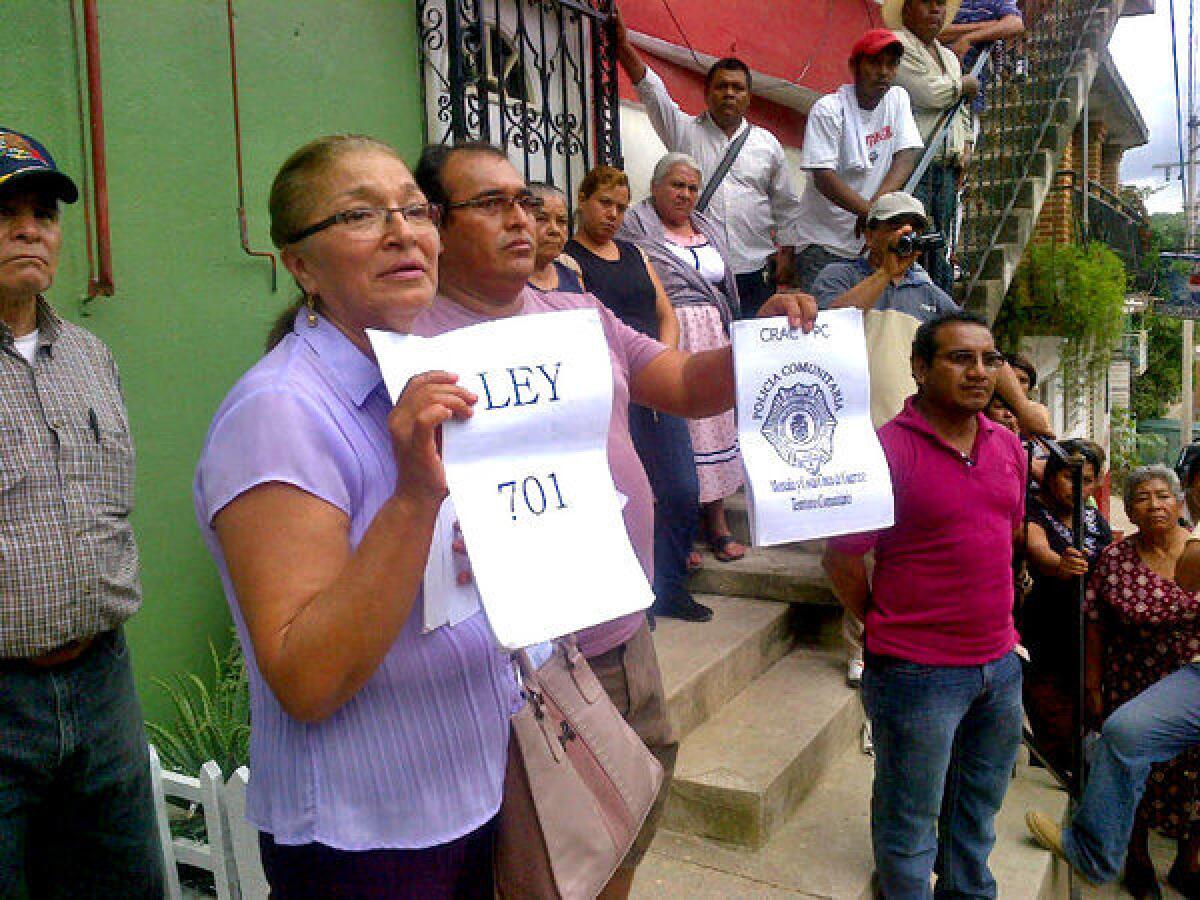
Marisela Jimenez, left, holds a copy of the law that allows indigenous pueblos to form community police squads. She is participating in a town meeting of Nestora Salgado's supporters in Olinala. More photos
Unlike other parts of Mexico, Guerrero has a long tradition of legally recognized community policing under rules for indigenous populations that were enacted largely in response to a 1995 massacre of peasants by state security forces.
There are specific requirements and restrictions: Their guns must be single-shot rifles and low-caliber pistols. Suspects in serious crimes must be turned over to the mainstream authorities.
Salgado and her supporters said they were availing themselves of those rules for indigenous pueblos to form a community police force under what is formally known as the Regional Coordinator of Community Authorities, or CRAC. Other towns across Guerrero followed suit.
But in Olinala, the townspeople soon began to squabble. Some wanted the army and navy to take charge of security and remain permanently. Others objected when Salgado's group allied itself with more radical elements of the CRAC, notably a passel of onetime leftist revolutionaries based in the Guerrero town of Paraiso ("Paradise").
Her enemies began looking for a reason to shut her down, and she gave it to them.

This summer, Salgado and her group arrested three teenage girls and accused them of dealing cocaine for their narco boyfriends. They sent the girls to a detention center at Paraiso, overreaching their legal authority, some in the town say.
Then she arrested a politically connected City Hall official and two associates, accusing them of stealing a cow. The three men were detained after the people who had been transporting the cow were killed in an ambush. That arrest was probably the last straw.
"We had to act [against criminals], but it should have been in a civilized manner," said Juan Rendon, a jovial merchant specializing in glass and aluminum siding, who originally rose up in arms with Salgado but then split from her faction. She now lists him as her major enemy.
Salgado and her allies "act like anarchists, without any respect for law or authority," Rendon said.
Salgado's allies insist, however, that each time they turned a suspect over to government officials, he or she was immediately released.
She had more right to be the leader because she has more guts than any man."—Marisela Jimenez, resident of Olinala
State authorities sent in the army to free the three cow theft suspects and arrest Salgado and 30 of her associates. It was late August; within hours, she was accused of kidnapping three adults and three minors (the girls, who were also freed) and transported to a federal penitentiary in Nayarit, on the Pacific coast.
Most have since been released; not Salgado. (Ordinarily, kidnapping is not a federal crime in Mexico, but federal jailing is allowed if authorities argue that the suspect is particularly dangerous.)
"I have nothing against the lady," Guerrero Gov. Angel Aguirre said at the time. "What I cannot permit, as governor … is [people taking justice] in their own hands. We cannot live by the law of the jungle."
Even her supporters say that what Salgado did may not have been illegal, but it was definitely ill-considered.
Vidulfo Rosales, an attorney with the Guerrero-based Tlachinollan human rights organization who is handling Salgado's case, said the parallel system of policing and justice that the vigilantes are operating is necessary because the official system is so corrupt.
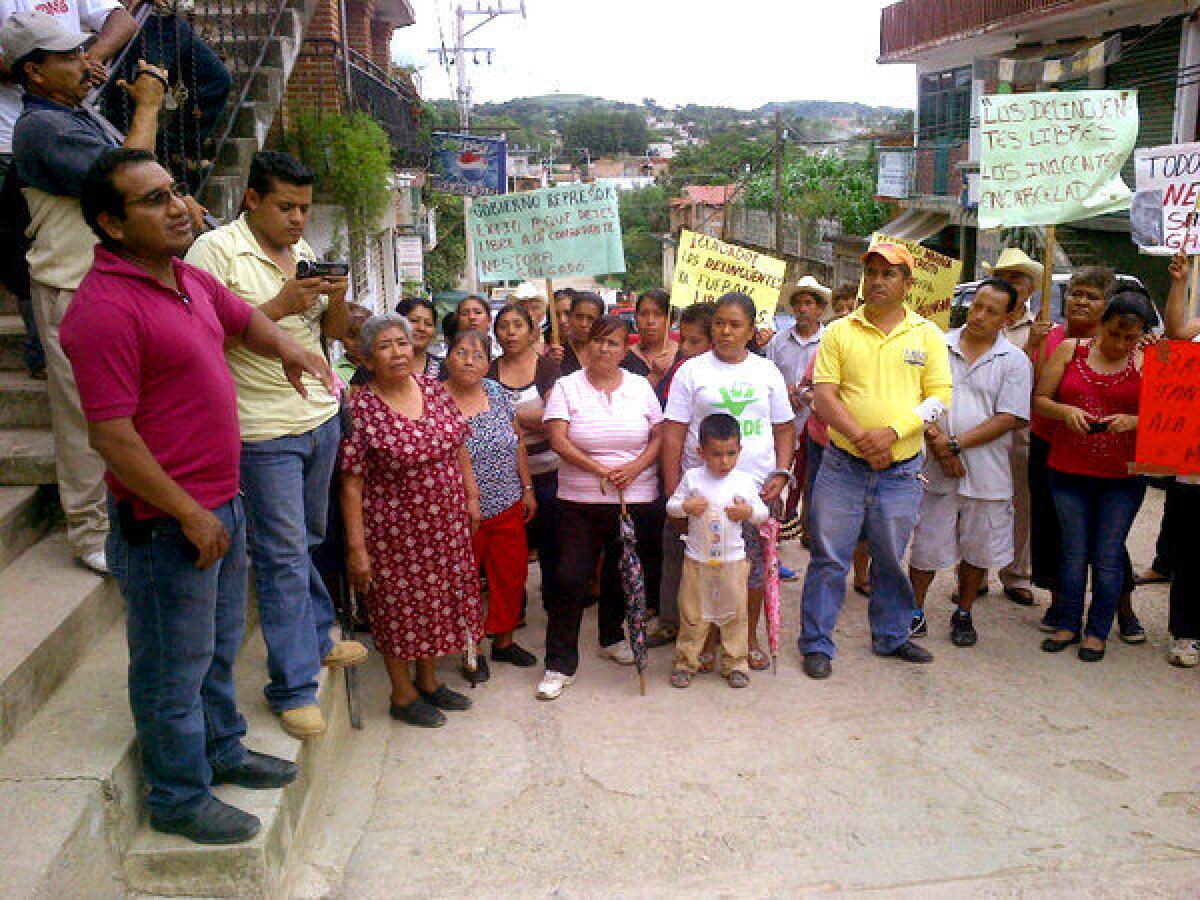
Nestora Salgado's attorney, Vidulfo Rosales of the Tlachinollan human rights organization, left, updates townspeople on Salgado's case during a meeting in Olinala. More photos
But he acknowledged that Salgado made costly political miscalculations in how she went about it.
"Having been away from Mexico for so long," he said, "she did not have a good analysis … of just how much power these people have and how they would react."

At this writing, only two people have been allowed into the prison to see Nestora Salgado: a daughter and a sister. Each traveled about 40 hours by bus to reach the penitentiary and then spent 40 minutes with her. Because Salgado is a U.S. citizen, the American Embassy intervened to persuade prison officials to allow the visits.
The daughter, Sayra, and the sister, Cleotilde, said she was downcast, but remained strong and determined.
Rosales, the attorney, says the government is making an example of Salgado. By cracking down on her hard, officials send a message to all people of Guerrero to stand down and behave. He believes government officials fear that tumultuous Guerrero could be the center of a wider uprising.
About that, they may be right.
Follow Tracy Wilkinson (@TracyKWilkinson) on Twitter
Follow @latgreatreads on Twitter
More great reads
Some Syrians rebuild amid the ruins
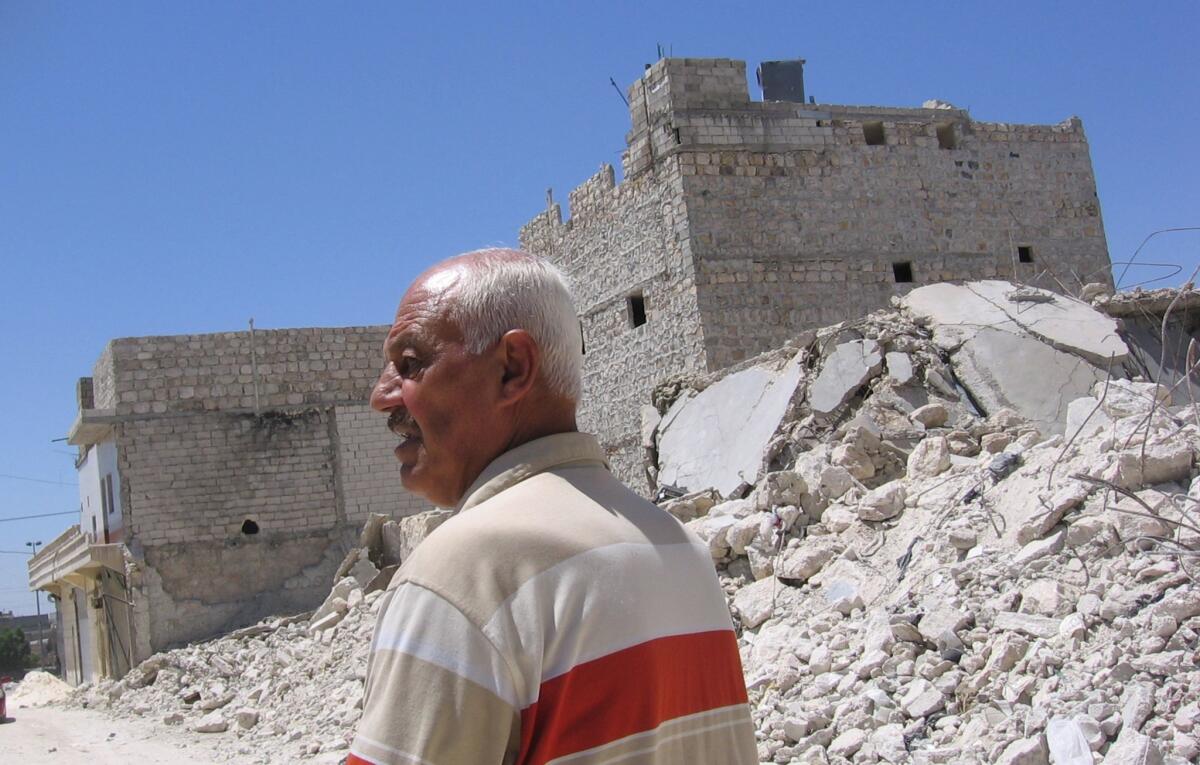
They are rebuilding with faith in God and hope in the revolution that soon it could be over."
Angels' Mike Trout is a Los Angeles star to watch

There's a fine line between cocky and confident. He's confident but doesn't cross over..."
Sign up for Essential California
The most important California stories and recommendations in your inbox every morning.
You may occasionally receive promotional content from the Los Angeles Times.
